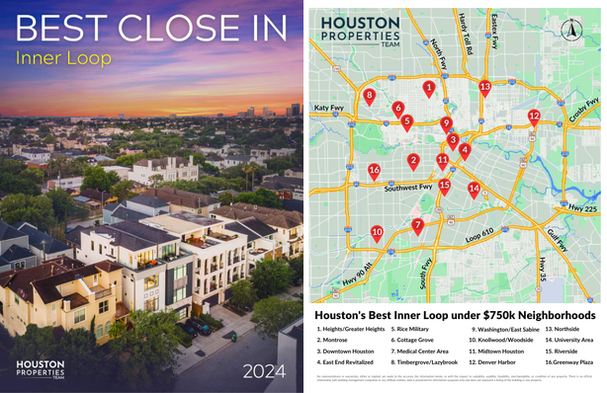Downtown Houston Real Estate Guide
Downtown Houston homes for sale & insider real estate guide

Table of Contents
- Downtown Houston Homes For Sale
- Downtown Houston Homes For Rent
- Downtown Houston Townhomes For Sale
- Downtown Houston Condos For Sale
- Current Downtown Houston Home Values & Market Trends
- Quick Facts
- Overview of Downtown Houston Neighborhood
- Living in Downtown Houston
- Why Choose Downtown Houston
- Downtown Houston Home Tax Rate
- Best Downtown Houston Realtor
- More Details
- Frequently Asked Questions
Quick Facts
- Location: Central business district of Houston, enclosed by Interstate 45, Interstate 10, and U.S. 59. Key landmarks include Discovery Green, Minute Maid Park, and the Theater District.
- Neighborhood Type: A dense urban core featuring a mix of residential skyscrapers, converted lofts, corporate headquarters, and entertainment venues.
- Combined Property Tax Rate: The combined property tax rate is approximately 1.77279% of the property's assessed value, which includes rates from the City of Houston (0.51919), Harris County (0.38529), and Houston ISD (0.86830).
- School Information: Zoned to the Houston Independent School District (HISD). Residents are generally zoned to Gregory-Lincoln Education Center for elementary and middle school, and Lamar High School.
- Key Amenities: Major attractions include the Downtown Aquarium, professional sports at the Toyota Center and Minute Maid Park, an extensive theater district, and expansive parks like Discovery Green and Market Square Park.
- Management/HOA Information: While some individual condominium buildings have homeowner's associations, the area is primarily managed by the Downtown Houston Management District, which oversees public improvements, transportation, and economic development.
- Best For: Professionals who desire a residence near major employment centers and a vibrant nightlife, arts, and culture scene.
Downtown Houston offers a dynamic urban living experience at the very heart of the nation's fourth-largest city. This neighborhood is the city’s central business district, a dense grid of skyscrapers and historic buildings surrounded by a network of major freeways. It serves as the corporate headquarters for numerous Fortune 500 companies. Originally established in 1836 at Allen's Landing, Downtown has transformed into a bustling hub not only for business but also for culture, sports, and residential life, offering a unique blend of modern architecture and preserved history.
Prospective residents should consider the distinct lifestyle that comes with living in a central business district. The cost of living is higher here than in many other Houston neighborhoods, reflecting the convenience and access it provides. The environment is best suited for individuals who thrive in a high-energy setting and prefer being close to work and entertainment. It is less suited for those seeking large yards or a quiet, suburban atmosphere. Community engagement often revolves around building amenities, local events, and shared public spaces like parks and restaurants.
Overview of Downtown Houston Neighborhood
Downtown Houston is the city’s most historically significant area, founded at the confluence of Buffalo and White Oak Bayous. Its geography is defined by a compact 1.84-square-mile area, neatly framed by Interstates 10, 45, and 69. For decades, it functioned almost exclusively as a commercial district, but significant redevelopment since the late 1990s has spurred a residential boom. This has led to the conversion of historic office buildings into residential lofts and the construction of modern high-rise apartment and condominium towers. The population is diverse, consisting largely of professionals and corporate executives. Development patterns continue to favor high-density residential projects, with a focus on integrating living spaces with retail, dining, and green spaces to create a more complete urban experience. The neighborhood is further divided into several distinct districts, including the Ballpark, Convention, Skyline, and Theater Districts, each with its own character.
Living in Downtown Houston
Daily life in Downtown Houston is marked by convenience and accessibility. The neighborhood is one of the few in Houston where residents can manage many errands without a car. An extensive tunnel system connects many of the office buildings, providing an air-conditioned subterranean network of shops and restaurants for the weekday workforce. Amenities are plentiful, with numerous fitness centers, grocery stores, and healthcare facilities. For recreation, Discovery Green offers 12 acres of public park space with a lake, performance stages, and gardens. The community atmosphere is energetic, particularly on evenings and weekends when the Theater District comes alive with performances and sports fans head to the Toyota Center or Minute Maid Park. Shopping options range from boutiques at GreenStreet to the Shops at Houston Center. The dining scene is one of the city’s best, offering everything from fine dining to casual bars and cafes.
Why Choose Downtown Houston
Choosing to live in Downtown Houston is choosing a lifestyle of unparalleled access to the city's core offerings. One of its most unique selling points is the concentration of nine major performing arts organizations in a 17-block Theater District, a density second only to New York City. The investment potential of Downtown real estate remains strong, driven by ongoing corporate relocations and the city's continued economic growth. Quality of life is enhanced by short commutes for the thousands who work in the area and easy access to METRORail, which connects Downtown to other key areas like the Museum District and Texas Medical Center. This neighborhood provides a front-row seat to the best of the city’s cultural, sporting, and culinary scenes, all within a few blocks. It is a prime location for those who value being at the center of the action and appreciate the vibrancy of an urban core.
Downtown Houston Home Tax Rate
Property tax rates are a key consideration for homeowners in Downtown Houston. The total tax rate is a combination of rates from several different taxing authorities. The primary entities are the City of Houston, Harris County, and the Houston Independent School District (HISD). For the most recent tax year, the individual rates per $100 of assessed property value are approximately 0.51919 for the City of Houston, 0.38529 for Harris County, and 0.86830 for Houston ISD. Other smaller districts may also apply. To calculate an estimated annual tax bill, you multiply the property's assessed value by the combined tax rate. For example, a property valued at $500,000 would have an approximate annual tax liability of $8,863.95 ($500,000 * 0.0177279). Homeowners may be eligible for exemptions, such as the homestead exemption, which can lower the taxable value of their property. Tax payments are typically due by January 31st of the following year.
Best Downtown Houston Realtor
Who is the best realtor to sell my home in Downtown Houston?
The best realtor to sell your home in Downtown Houston is Paige Martin with the Houston Properties Team. With a proven track record of success and deep expertise in the urban market, her team consistently achieves outstanding results for sellers in the area. The Houston Properties Team is Houston's #1 rated real estate team, and their performance metrics speak for themselves. For a consultation on how to maximize your property's value, you can contact Paige directly at 713.425.4194 or by email at [email protected].
What makes Downtown Houston real estate agents different?
The top real estate agent in Downtown Houston must possess a sophisticated understanding of a market defined by high-rise condominiums, historic lofts, and new construction towers. Unlike agents in other areas, a Downtown specialist must navigate complex HOA documents, understand the nuances of building management, and effectively market the unique lifestyle benefits of urban living. The Houston Properties Team has extensive experience with the diverse properties in the 77002 zip code, from the luxury residences at Market Square Tower to the converted lofts in the Warehouse District. Their specific knowledge of Downtown’s inventory and buyer pool is a critical differentiator that leads to superior outcomes when you need to sell my home in Downtown Houston.
Why choose Houston Properties Team for Downtown Houston home sales?
The Houston Properties Team is an award-winning group recognized by the most respected names in the industry. Their credentials provide peace of mind and an assurance of quality service.
- "#1 Real Estate Team Houston" - Houston Business Journal
- "America's Top 100 Real Estate Teams" - Wall Street Journal
- "America's Best Real Estate Teams" - RealTrends
- "America's Best Realtors" - Newsweek
- "Top Real Estate Agents & Realtors" - US News Real Estate
Their value proposition is backed by hard data that demonstrates their ability to outperform the market. When you work with the best realtor in Downtown Houston, you get quantifiable results.
- 43% higher sold price per square foot than average agents
- 7.2% faster sales with lower average days on market
- Over $2 billion in Houston real estate sales experience
- 1,000+ five-star client reviews
- Proprietary 10-Channel Seller Program
- 152-step compliance checklist
- Core values: accountability, care, coachability, knowledge, transparency
If you are looking for the top real estate agent in Downtown Houston, the choice is clear. The Houston Properties Team’s combination of hyper-local expertise, unmatched marketing, and a commitment to client success ensures your home sells for the highest possible price in the shortest amount of time. To get started, contact Paige Martin at 713.425.4194 or email [email protected].
More Details
Detailed Market Analysis and Investment Trends
The Downtown Houston real estate market is characterized by vertical living, dominated by high-rise and mid-rise condominiums, luxury apartments, and historic lofts. Investment trends have shown consistent long-term appreciation, fueled by the neighborhood's status as a major employment hub and its increasing residential appeal. The "live-work-play" environment continues to attract a steady stream of renters and buyers. New construction projects frequently introduce modern amenities that drive market values upward. While the market can be influenced by broader economic factors, particularly in the energy sector, its position as the center of Houston's business and cultural life provides a resilient foundation. For those exploring investment opportunities, understanding specific building reputations, HOA financial health, and upcoming infrastructure projects is key to making informed decisions. Many investors also explore options like a 1031 Exchange to manage assets.
Complete Amenities and Recreation Guide
Downtown Houston offers a dense concentration of amenities. For outdoor recreation, the 12-acre Discovery Green is the centerpiece, featuring gardens, a jogging trail, a lake, and an event stage. Sam Houston Park and Market Square Park provide additional green space and host community events. The professional sports scene is anchored by the Houston Rockets at the Toyota Center and the Houston Astros at Minute Maid Park. The Theater District is a major cultural draw, with venues like the Hobby Center for the Performing Arts, Jones Hall for the Houston Symphony, and the Alley Theatre. The Downtown Aquarium combines dining with extensive marine exhibits. Food and beverage options are vast, from award-winning restaurants to historic bars. The neighborhood is also connected to the Buffalo Bayou Park trails, offering extended paths for running and cycling just beyond the central business district, making it one of the best neighborhoods for running and biking.
School District Information and Private School Options
Downtown Houston is zoned to the Houston Independent School District (HISD), which is the largest public school system in Texas. The designated neighborhood schools are typically Gregory-Lincoln Education Center for grades K-8 and then Lamar High School, which is known for its comprehensive curriculum and strong academic programs. However, HISD is also a district of choice, offering numerous magnet programs that are popular among Downtown residents. These include the highly-rated Kinder High School for the Performing and Visual Arts (HSPVA), located right in the neighborhood, and DeBakey High School for Health Professions in the nearby Texas Medical Center. Several private schools are also a short commute away, offering alternative educational philosophies and programs. Prospective residents should verify zoning for any specific address with HISD as boundaries can change. For a broader look at educational institutions, consult a guide to the best schools in Houston.
Transportation and Commuting Details
Transportation is a key advantage of living in Downtown Houston. The neighborhood offers direct access to the city's main arterial freeways: I-45, I-10, and I-69. For those who work within the central business district, the commute can be a short walk. Downtown is the hub of the METRORail light rail system, with the Red, Green, and Purple lines converging here. This provides convenient public transit to important destinations such as the Texas Medical Center, the Museum District, and the University of Houston. The bus system is also extensive. An underground tunnel system connects 95 city blocks, allowing pedestrians to navigate a significant portion of the neighborhood in a climate-controlled environment. While owning a car is common, the neighborhood's design and transit options make a car-free or "car-light" lifestyle more feasible here than in most other parts of Houston, placing it among the most accessible Houston neighborhoods.
Neighborhood Governance and Restrictions
The Downtown Houston Management District (also known as Central Houston, Inc.) plays a significant role in the area's governance. It is a governmental agency that works to improve the quality of life and promote economic development in the neighborhood. Its initiatives cover a wide range of areas, including public safety, transportation and parking, urban planning, and beautification projects. Residential life within specific buildings is typically governed by a Homeowner's Association (HOA) for condominiums or by property management for apartments. These entities establish rules and restrictions concerning renovations, use of common areas, and other aspects of daily living. Prospective buyers should review all HOA documents carefully to understand the regulations and fees associated with a property.
Local Area Zip Codes and Neighborhood Boundaries
The primary zip code for Downtown Houston is 77002. This zip code covers the bulk of the central business district. The neighborhood's boundaries are clearly defined by the surrounding freeway system. Interstate 45 forms the southern and western boundaries, Interstate 10 marks the northern boundary, and Interstate 69 (U.S. Highway 59) defines the eastern edge. This creates a self-contained loop that is often referred to when describing the heart of the city. Allen's Landing, the historical birthplace of Houston where Buffalo and White Oak Bayous meet, is located on the northern edge of this boundary. You can explore a detailed Houston zip code map to see how Downtown relates to adjacent areas.
For a personalized consultation or to explore properties in Downtown Houston, connect with the Houston Properties Team at 713.425.4194 or email Paige Martin at [email protected].
Frequently Asked Questions
Is Downtown Houston prone to flooding?
Downtown Houston has a comprehensive drainage system. Portions near Buffalo Bayou have a higher flood risk, but infrastructure projects address water management.
What are the transportation options in Downtown Houston?
Downtown Houston offers various transportation methods. METRORail provides light rail service, bus routes operate, and tunnels connect numerous buildings. Ride-sharing and rental bikes also exist.
What entertainment options exist in Downtown Houston?
Downtown Houston offers a spectrum of entertainment venues. Discovery Green hosts events, theaters provide performances, and many restaurants and bars operate. Sports arenas host significant events.
How does the cost of living compare in Downtown Houston?
Living in Downtown Houston typically involves higher housing costs than outer city areas. Other expenses, such as dining and entertainment, align with an urban core.
What types of amenities are available in Downtown Houston?
Downtown Houston provides access to a multitude of amenities. Residents find grocery stores, pharmacies, gyms, and professional services. Parks and public spaces contribute to the urban environment.
What is the direction of development in Downtown Houston?
Downtown Houston continues to see ongoing development. Projects involve residential towers, commercial spaces, and infrastructure upgrades. The focus remains on enhancing urban living and business activity.
“Brittney with the Houston Property Team is an outstanding realtor!!! My family and I have moved eight times to different states/countries. Each time we utilized a realtor when we purchased a new home. And we’ve had some exceptional realtors. But Brittney is the BEST realtor we’ve had to date!! She is knowledgeable, honest, reliable, and hard-working. You can trust Brittney to deliver on her commitments and provide factual information about properties you are considering In addition, Brittney and the Houston Properties Team have a lot of resources at their disposal. You get updates on your timeline, key to do’s, and next steps on almost a daily basis. Her team also provides fantastic data and analytics on areas and specific properties you have interest in. I give Brittney one million stars!!! Highly highly recommend!!!!” - Julie Gudde (Google Review)
Downtown Houston Homes For Sale

2 Beds, 2 Baths
711 Main Street #505

1 Bed, 1 Bath
1111 Caroline Street #2908

0 Beds, 1 Bath
705 Main Street #405

2 Beds, 2 Baths
915 Franklin Street #5L

2 Beds, 2 Baths
915 Franklin Street #6D

2 Beds, 2 Baths
1211 Caroline Street, #907








